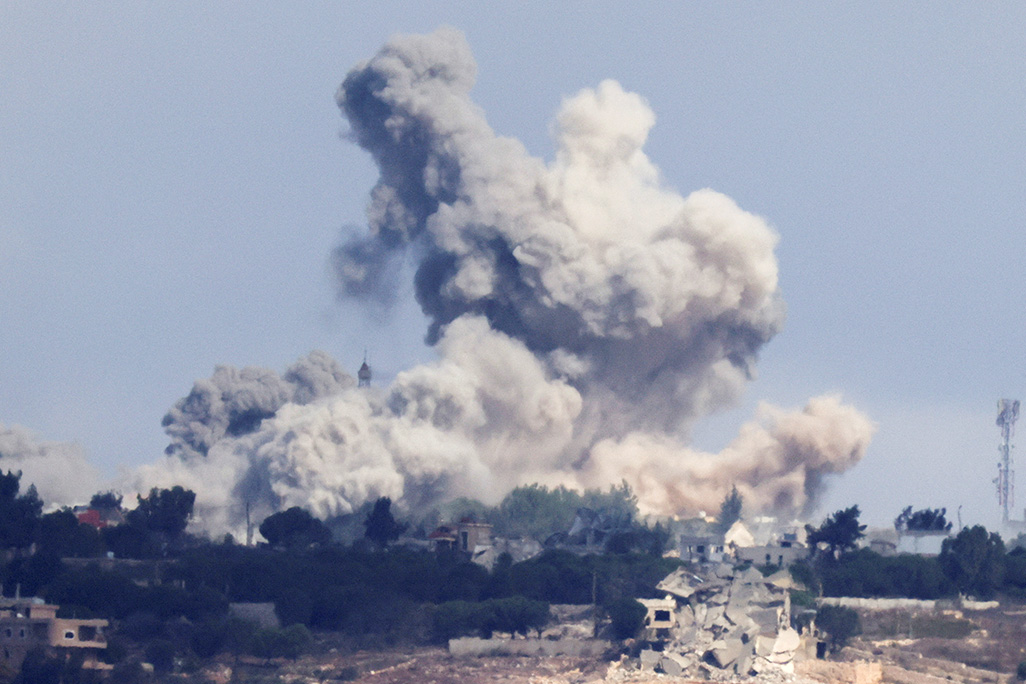Israel said on Wednesday eight of its soldiers were killed in combat in south Lebanon as its forces thrust into its northern neighbour in a campaign against the Hezbollah armed group.
The losses were the deadliest suffered by the Israeli military on the Lebanon front in the past year of border-area clashes between Israel and its Iranian-backed Lebanese foe.
Hezbollah said its fighters were engaging Israeli forces inside Lebanon on Wednesday, reporting ground clashes for the first time since Israeli forces pushed over the border. Hezbollah said it had destroyed three Israeli Merkava tanks with rockets near the border town of Maroun El Ras.
Israeli Prime Minister Benjamin Netanyahu, in a condolence video, said: “We are at the height of a difficult war against Iran’s Axis of Evil, which wants to destroy us.
“This will not happen because we will stand together and with God’s help, we will win together,” he said.
The Israeli military said regular infantry and armoured units were joining its ground operations in Lebanon, a day after Iran fired more than 180 missiles into Israel, a barrage which raised concerns that the oil-producing Middle East could be caught up in a wider conflict.
Iran said on Wednesday its missile volley – its biggest ever assault on Israel – was over barring further provocation, but Israel and the United States promised to hit back hard.
A 38-year-old Palestinian from Gaza, the only known fatality in Iran’s attack on Israel, was buried on Wednesday.
Sameh Khadr Hassan Al-Asali had been staying in a Palestinian security forces compound in the West Bank when he was killed by falling missile debris during Tuesday’s attack, which Israel said was largely foiled by its air defence systems.
Hezbollah said it had repelled Israeli forces near several border towns and also fired rockets at military posts inside Israel.
The paramilitary group’s media chief Mohammad Afif said those battles were only “the first round” and that Hezbollah had enough fighters, weapons and ammunition to push back Israel.
Israel’s addition of infantry and armoured troops from the 36th Division, including the Golani Brigade, the 188th Armoured Brigade and 6th Infantry Brigade, suggested that the operation might expand beyond limited commando raids.
The military has said its incursion is largely aimed at destroying tunnels and other infrastructure on the border and there were no plans for a wider operation targeting the Lebanese capital Beirut to the north or major cities in the south.
Nevertheless, it issued new evacuation orders for around two dozen towns along the southern border, instructing inhabitants to head north of the Awali River, which flows east to west some 60 km (37 miles) north of the Israeli frontier.
BORDER CLASHES
Israel renewed its bombardment early on Wednesday of Beirut’s southern suburbs, where Hezbollah has its headquarters, with more than a dozen airstrikes against what it said were targets belonging to Hezbollah.
Israel also carried out an airstrike on a residential building in the Mezzah suburb in the west of Syria’s capital Damascus, killing three civilians and injuring three, Syrian state media reported on Wednesday. Israel has been carrying out strikes on Iran-linked targets in Syria for years.
More than 1,900 people have been killed and over 9,000 wounded in Lebanon in almost a year of cross-border fighting, with most of the deaths occurring in the past two weeks, according to Lebanese government statistics.
Caretaker Prime Minister Najib Mikati said that about 1.2 million Lebanese had been displaced by Israeli attacks.
Malika Joumaa, from Sudan, was forced to take shelter in Saint Joseph’s church in Beirut after being forced from her house near Sidon in coastal south Lebanon with her husband and two children.
“It’s good that the church offered its help. We were going to stay in the streets; where would we have gone? We were (sheltering) under the bridge, it is not safe. If we go back home, it is not safe, they are striking everywhere.”
Iran described Tuesday’s missile assault as a response to Israeli killings of militant leaders, including Hezbollah chief Hassan Nasrallah, attacks in Lebanon against the group and Israel’s war against Palestinian Hamas militants in Gaza.
The general staff of Iran’s armed forces said any Israeli response would be met with “vast destruction”.
U.S. news website Axios on Wednesday cited Israeli officials as saying Israel will launch a “significant retaliation” for Iran’s attack within days that could strike oil production facilities inside Iran and other strategic sites.
U.S. President Joe Biden’s administration is seeking to align its position with close ally Israel on any potential response to Iran’s attack but also recognizes the Middle East is on a “knife’s edge” and a broader escalation could imperil both Israeli and U.S. interests, U.S. Deputy Secretary Kurt Campbell told an event hosted by a Washington think-tank on Wednesday.
Biden joined a call with Group of Seven major power leaders on Wednesday to coordinate a response, including new sanctions against Tehran, the White House said.
The G7 leaders voiced “strong concern” over the Middle East crisis but said a diplomatic solution was still viable and a region-wide conflict was in no one’s interest, a statement said.
FEAR, RESIGNATION IN IRAN
On social media, Iranians were apprehensive about Israeli reprisals and said past wars, such as the eight-year conflict with Iraq in the 1980s that killed about one million people, would only bring more suffering.
“The destruction of generations, young people being cannon fodder, the enrichment of generals and elites, and the empowerment of extremists? Leaders will not pay for dragging Iran into war,” said Nima Mokhtarian, who works at an NGO.
Some Iranians believe their government had no choice but to send scores of missiles to Israel, but fear what will come next as Israel’s military, the most powerful and advanced in the region, prepares to hit back.







Click here to change your cookie preferences